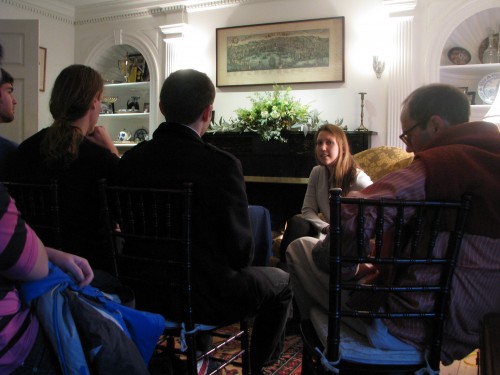Sarah Stillman (PC ’06): the search for truth as an Investigative Journalist

By Janine Chow:
Today, Pierson College welcomed back Sarah Stillman, investigative reporter and Piersonite from the class of 2006. Before a flickering fire in the cramped comfort of the master’s house, Master G glowed as he introduced his former student.
“Sarah is a person who searches for truth.”
Stillman’s feature story in the New Yorker about human trafficking in American military bases in Iraq and Afghanistan has received much acclaim and has been named a finalist for the Daniel Pearl Award for Outstanding International Investigative Reporting. But at the Master’s Tea today Stillman told of her own journey as a Yalie venturing out to discover and express truths about the world.

Stillman began her story in the Pierson-Davenport gym, running on the elliptical, watching a muted Fox News. The news ticker reported that a body discovered in a lake “was not” the body of a girl reported missing some weeks before. The unanswered question: who was that body?
Stillman decided to investigate. A call to the police revealed the woman’s name: Donna Cook, a known prostitute. Stillman ultimately ended up visiting the town where the body had been found and tracking Cook’s family to Ohio, with whom she visited and spent time. Her senior essay discussed the sensationalism surrounding “missing white girl syndrome.”
“I try to look at the story at the margins,” said Stillman.
And that aim has carried her into her career as a freelance investigative reporter.
After graduating Yale, going to Oxford for graduate school, and obtaining a fellowship from NYU, Stillman travelled to U.S. military bases in Iraq and Afghanistan with appropriately named Truthdig. The first sights that met her eyes, she said, were “a Pizza Hut, a Burger King, and a beauty salon.”
It was in the beauty salon, over a manicure, that she began uncovering stories. Here was a Fijian woman, Stillman found, one of many who had been promised jobs in a luxurious hotel in Dubai but who instead found themselves in Iraq giving soldiers manicures in U.S. bases. Here were women who had been sexually assaulted with no means to attain recompense through thick layers of bureaucracy, what Stillman called “legal black holes.”
It was such stories as these that Stillman brought to light in her journalism.
When asked why she had chosen to go to Iraq, Stillman explained that she wanted to do something “meaningful.” After having experienced on-campus Yale efforts in protest of the war in Iraq, she wanted to gain a personal, more real understanding of the war.
“I wanted to find a way to take these abstract horrors from my head—something I could read about—and make them into something I could engage in kinetically.”
With regards to investigative journalism, she said clearly, “I wanted to listen to people in an honest way.”
Near the end of the master’s tea, discussion turned to the power of journalism to effect real change. “It’s difficult,” said Stillman, because hearing people’s terrible stories and writing about them won’t “immediately change” or improve these people’s situations. She added that at least three people who she had talked to during her investigations contact her every day asking for help. Stillman does what she can.
Stillman’s story is a hopeful one for any Yalie aspiring to the field of journalism. And here’s the kicker, she said as the master’s tea drew to a close: “I never wrote for the YDN.”
Janine Chow is a freshman in Jonathan Edwards College. Contact her at janine.chow@yale.edu.